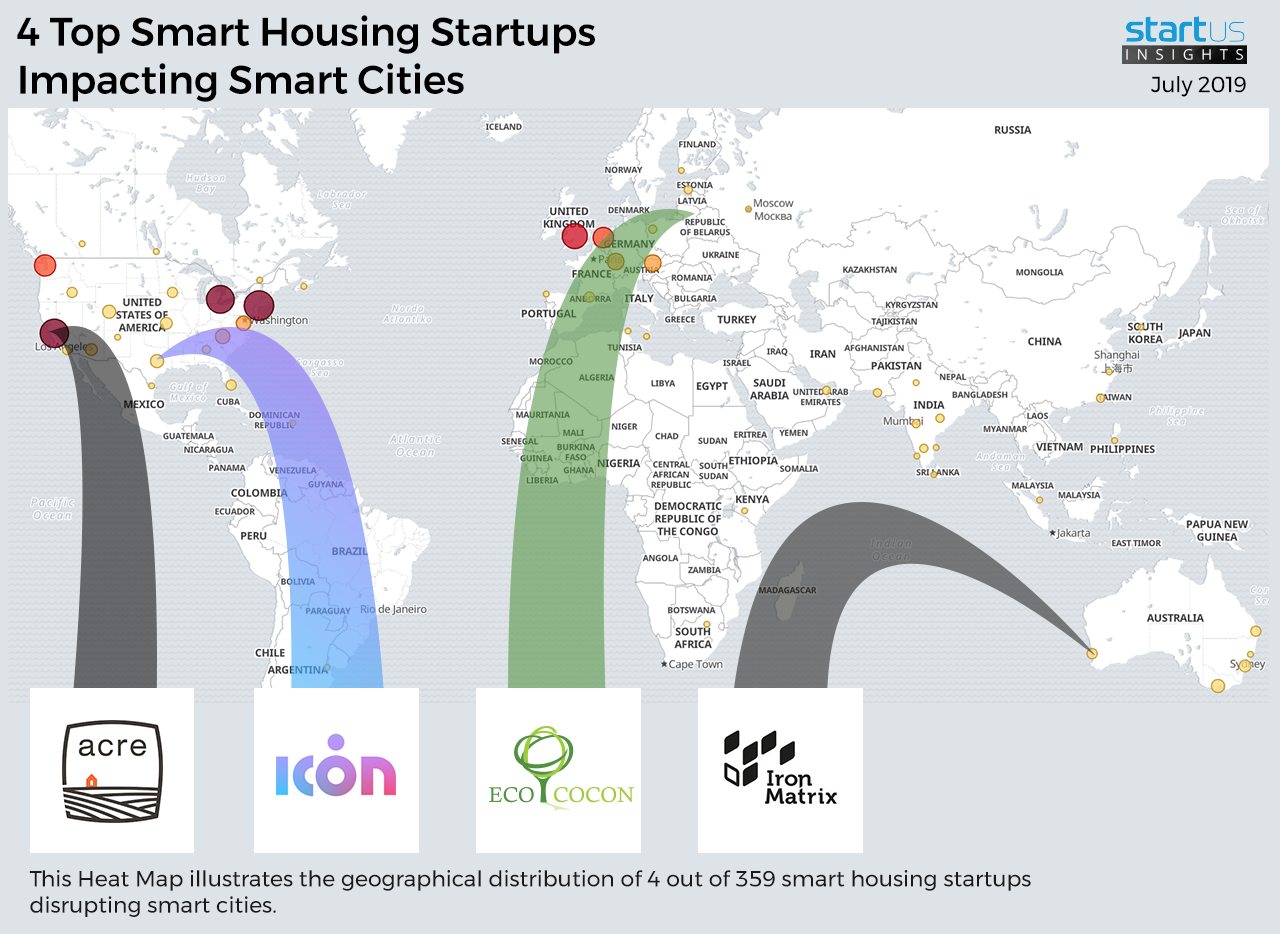Our Innovation Analysts recently looked into emerging technologies and up-and-coming startups working on solutions for Smart Cities. As there is a large number of startups working on a wide variety of solutions, we decided to share our insights with you. This time, we are taking a look at 4 promising Smart Housing solutions.
Heat Map: 4 Top Smart Housing Startups
For our 4 top picks, we used a data-driven startup scouting approach to identify the most relevant solutions globally. The Global Startup Heat Map below highlights 4 interesting examples out of 359 relevant solutions. Depending on your specific needs, your top picks might look entirely different.
Iron Matrix – Modular Housing
Building modular homes intends to solve affordability, weather-dependence and delaying challenges of the construction industry in smart cities. Cost and time effectiveness, as well as flexibility, are mostly achieved through automated in-house manufacturing of the main structural components, offsite labor, and quick module-by-module assembly. Iron Matrix from Perth, Australia, manufactures configurable steel frames and replaces conventional cladding materials with solar panels to create efficient construction modules. Thanks to adaptable and expandable steel components, the solution easily suits personalized needs and requires only two people to install without any heavy equipment.
ICON – 3D Printed Housing
Employing 3D printing for smart housing helps to create a programmable version of a future house and deploy it virtually over a couple of days. Intelligent robotics requires minimal human interaction and automatically recreates a house model out of high-quality building materials. In the nearest future, 3D printed housing has to partially tackle one more modern city problem – homelessness. ICON form the USA develops a 3D printer, called Vulcan II, with approximately 2,000 square feet printing capability. The startup accompanies Vulcan II with intuitive tablet controls, remote monitoring features, a gantry system for precise deposition over large areas, and advanced Lavacrete building material to ensure smooth and resilient housing development.
Acre – Passive Zero-Energy Housing
As commercial and residential buildings consume a considerable amount of energy, there is a need to lower power consumption in smart cities given the risks of resource depletion and climate change. Passive houses attain this goal by implementing improved fabric for insulation, maintaining low carbon heat, and applying renewables. Net-zero energy houses work on the principles of thermal gain optimization and thermal loss minimization. The US-based startup Acre offers it’s Series A and Series B housing products based on passive solar space-efficient design, tight building envelopes, ultra-low-flow plumbing fixtures, and advanced phase change material (PCM) to manage heating/cooling loads and get close to zero-energy balance. The company applies a hybrid approach, combining prefab zeroBOX utility core with the onsite advanced flat-pack system.
EcoCocon – Natural Materials Housing
Compared to traditional and widely used concrete, natural building materials produce a lower environmental impact and make housing much more nature-like. This type of homes ground on the use of straw bales, hemp, bamboo, rammed ground, and even recyclables. This encourages the use of new sustainable materials such as grasscrete, hempcrete, ashcrete, or timbercrete, and also promotes local economies through the use of indigenous and previously unemployed resources. EcoCocon from Lithuania produces environmentally friendly straw bale panels for house construction. The company employs a method, which integrates straw into the wood frame and performs an extremely dense compression resulting in high thermal resistance, airtightness, sound insulation, and fire safety while also being cost-efficient.
What About The Other 355 Solutions?
While we believe data is key to creating insights it can be easy to be overwhelmed by it. Our ambition is to create a comprehensive overview and provide actionable innovation intelligence for your Proof of Concept (PoC), partnership, or investment targets. The 4 startups showcased above are promising examples out of 359 we analyzed for this article. To identify the most relevant solutions based on your specific criteria and collaboration strategy, get in touch.









